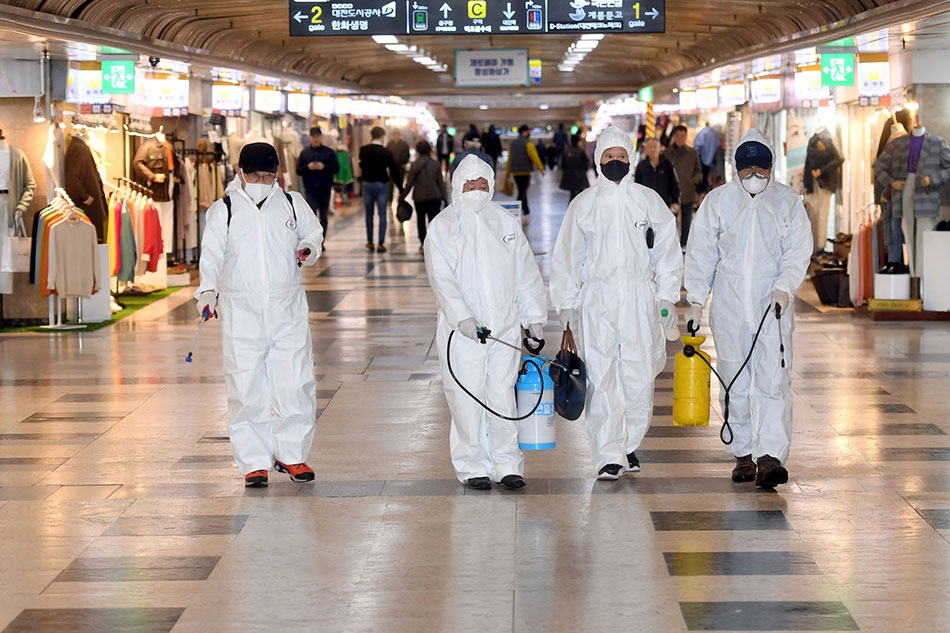Filipino tourists barred from traveling to South Korea due to COVID-19 | ABS-CBN

Welcome, Kapamilya! We use cookies to improve your browsing experience. Continuing to use this site means you agree to our use of cookies. Tell me more!
Filipino tourists barred from traveling to South Korea due to COVID-19
Filipino tourists barred from traveling to South Korea due to COVID-19
Arianne Merez,
ABS-CBN News
Published Feb 26, 2020 02:24 PM PHT
|
Updated Feb 26, 2020 02:44 PM PHT
PH bars entry of travelers from North Gyeongsang
PH bars entry of travelers from North Gyeongsang
MANILA- The Philippines has barred its citizens from traveling to tourist-favorite South Korea as a protective measure against the COVID-19 which is rapidly spreading in the East Asian nation, Malacañang said Wednesday.
MANILA- The Philippines has barred its citizens from traveling to tourist-favorite South Korea as a protective measure against the COVID-19 which is rapidly spreading in the East Asian nation, Malacañang said Wednesday.
The ban which is applied to all Filipino tourists also covers those going to Jeju Island and is “effective immediately,” Presidential Spokesman Salvador Panelo said.
The ban which is applied to all Filipino tourists also covers those going to Jeju Island and is “effective immediately,” Presidential Spokesman Salvador Panelo said.
Exempted from the ban are Filipinos who are workers, students, and permanent residents of South Korea, as long as they sign a written declaration signifying their knowledge of the “risks” of traveling there.
Exempted from the ban are Filipinos who are workers, students, and permanent residents of South Korea, as long as they sign a written declaration signifying their knowledge of the “risks” of traveling there.
“The safety and security of Filipinos here and the outside the Philippines remain our primary concern. Our countrymen's welfare is foremost in our minds as concerned officials discuss updates and recommendations on the management of the coronavirus,” Panelo said.
“The safety and security of Filipinos here and the outside the Philippines remain our primary concern. Our countrymen's welfare is foremost in our minds as concerned officials discuss updates and recommendations on the management of the coronavirus,” Panelo said.
ADVERTISEMENT
Travelers coming from the South Korean province of North Gyeongsang are barred from entering the Philippines “effective immediately” as agreed by the Inter-Agency Task Force on Emerging Infectious Diseases, Panelo said.
Travelers coming from the South Korean province of North Gyeongsang are barred from entering the Philippines “effective immediately” as agreed by the Inter-Agency Task Force on Emerging Infectious Diseases, Panelo said.
If not from North Gyeongsang, Filipino and foreign travelers may enter the Philippines, he added.
If not from North Gyeongsang, Filipino and foreign travelers may enter the Philippines, he added.
As to the other parts of South Korea, Panelo said the IATF shall conduct a risk assessment of the situation in the said country within 48 hours to analyze whether it is necessary to expand the travel ban.
As to the other parts of South Korea, Panelo said the IATF shall conduct a risk assessment of the situation in the said country within 48 hours to analyze whether it is necessary to expand the travel ban.
“In the meantime, strict protocols with respect to travelers entering the country from these areas in South Korea will continue to be observed,” Panelo said.
“In the meantime, strict protocols with respect to travelers entering the country from these areas in South Korea will continue to be observed,” Panelo said.
South Korean President Moon Jae-in on Sunday raised the country's alert level on the new coronavirus to the "highest" in the face of a sudden spike in the number of infections.
South Korean President Moon Jae-in on Sunday raised the country's alert level on the new coronavirus to the "highest" in the face of a sudden spike in the number of infections.
South Korea has seen a rapid surge in the number of coronavirus cases -- adding more than 700 cases in less than a week -- since a cluster of infections emerged from a religious sect in the southern city of Daegu.
South Korea has seen a rapid surge in the number of coronavirus cases -- adding more than 700 cases in less than a week -- since a cluster of infections emerged from a religious sect in the southern city of Daegu.
Most of the country's cases are connected to the Shincheonji Church of Jesus in the southern city of Daegu, including 129 of Monday's confirmations, the Korea Centers for Disease Control and Prevention said in a statement.
Most of the country's cases are connected to the Shincheonji Church of Jesus in the southern city of Daegu, including 129 of Monday's confirmations, the Korea Centers for Disease Control and Prevention said in a statement.
The Korean government has extended kindergarten and school holidays by one week nationwide and plans to enforce tighter two-week monitoring of arrivals from China.
The Korean government has extended kindergarten and school holidays by one week nationwide and plans to enforce tighter two-week monitoring of arrivals from China.
The outbreak also forced South Korean tech giant Samsung Electronics to suspend operations at its smartphone plant in Gumi, 200 kilometers (125 miles) southeast of Seoul, after one of its employees was infected at the weekend. - With reports from Agence France-Presse
The outbreak also forced South Korean tech giant Samsung Electronics to suspend operations at its smartphone plant in Gumi, 200 kilometers (125 miles) southeast of Seoul, after one of its employees was infected at the weekend. - With reports from Agence France-Presse
ADVERTISEMENT
ADVERTISEMENT


